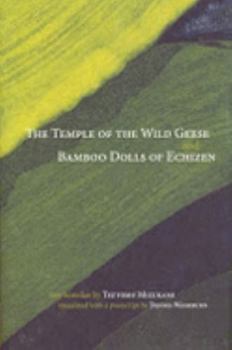Temple of Wild Geese and Bamboo Dolls of Echizen
(Part of the Japanese Literature Series)
Select Format
Select Condition 
Book Overview
The Temple of the Wild Geese, a semi-autobiographical account of Mizukami's childhood, tells the tale of Jinen, a Buddhist monk raised by villagers after his mother, a beggar, abandoned him. Sent to live at a temple at the age of ten, his resentment smolders for years until it explodes in a shocking climax. In Bamboo Dolls of Echizen, no woman is willing to marry the diminutive Kisuke, a bamboo artisan, until Tamae, a prostitute, comes to pay her...
Format:Hardcover
Language:English
ISBN:1564784908
ISBN13:9781564784902
Release Date:March 2008
Publisher:Dalkey Archive Press
Length:208 Pages
Weight:1.06 lbs.
Dimensions:0.8" x 6.3" x 9.1"
Grade Range:Postsecondary and higher
Customer Reviews
1 rating
Dreary Double Feature
Published by Thriftbooks.com User , 16 years ago
Whenever life gets too bright and cheerful for you, these two signature novellas by Mizukami Tsutomu are the perfect corrective. Both "The Temple of the Wild Geese" of 1961 and "The Bamboo Dolls of Echizen" of 1963 established this author as a writer of serious fiction (though the book in question here marks his belated English debut), and both works are deeply troubling if not disturbing explorations of the human condition in an uncompromisingly naturalist and social realist mode deepened by unflinchingly keen if somewhat datedly Freudian psychological insight. Indeed, the primary conflicts and tensions driving the plots forward in both stories are clearly and unabashedly oedipal in nature, and murky shades of eros and thanatos subconsciously motivate the characters throughout. Most bleakly of all, the graceful and beautiful works of art for which both novellas are titled offer a glimmer of hope and salvation but in the end fail and vanish into obscurity. Rare is it though that such depressingly dreary tales are told with such consummate craftsmanship. Based to some degree probably on his experience in writing popular pulp novels, Mizukami knows how to tell a story so that it reaches out and grabs you, and I found myself compulsively reading through each novella straight through to the bitter end. Even when I could see all too clearly where the downwards spiral was tending. No, sometimes especially then. Adding to this fatal attraction is the author's gift for taking the stock characters from melodrama and detective fiction and fleshing them out believably and complicatedly. There are also interesting fragments of social history to be found here, both in the unvarnished, unromantic glimpse at the sordid side of everyday life in the Zen temples of Kyoto and the straightforwardly realistic treatment of the urban economy's encroachment into outlying rural areas and the resulting commercialization and commodification of folk art that ensues for better or worse (or both, as the case usually is). Finally, when so much of modern Japanese literature is fixated on Tokyo, it's always nice to get a little Kansai balance with works like this set squarely in the old capital of Kyoto and the Hokuriku region northeast of it. Still, the monotonously gloomy nature of these two novellas works against Mizukami just a bit. It's as if he's stuck painting from the same limited palette again and again. This is not to say that what he so compellingly depicts is not an aspect of human life; certainly it is, but it is after all only one aspect when with Mizukami that's about all you get. On a different note, some of his symbolism is rather strained as well as obvious, and he hits you over the head a few times with decidedly unsubtle foreshadowings. The point of view also sometimes seems to fritter about from person to person rather more freely than is normal for serious fiction, perhaps a holdover from Mizukami's prior writing career. All of which just means that what






